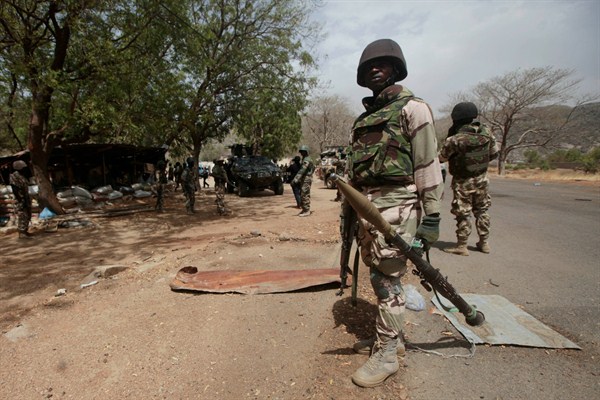Vast ungoverned spaces, weak security institutions, corrupt administrations and scarce economic opportunities are all factors contributing to the entrenchment of Islamist extremism in West Africa and the Sahel. Regional governments have struggled to respond to the threat and ensure security, and in some cases their actions have only made things worse. Could the planned “G5 Sahel Joint Force” represent a turning point? This WPR Special Report assesses what’s at stake.
Purchase this special report as a Kindle e-book.
The Roots of Conflict
How West Africa Became Fertile Ground for AQIM and ISIS
Al-Qaida in the Islamic Maghreb and the so-called Islamic State have expanded their footprint in the Sahel and West Africa, looking to economic hubs and coastal areas that had previously been spared from violence. Unless regional governments and international actors change strategy, Anouar Boukhars warned in November, instability across the region will likely deepen.
Boko Haram has been losing territory for more than two years as a result of joint military pressure from Nigeria, Niger, Chad and Cameroon. But while far weaker than it was at the height of its power, the Islamic State-affiliated movement is still a major threat to Nigeria and its neighbors, Alex Thurston wrote in March. Its decline has been uneven and is frequently punctuated by shocking attacks.
Herders vs. Farmers: Nigeria’s Other Security Crisis
While Boko Haram draws the bulk of global headlines and local military attention, fatal clashes between Fulani cattle herders and Nigerian farmers remain disturbingly common. In fact, the 2015 Global Terrorism Index designated “Fulani militants” collectively as the fourth-deadliest terror group in world. Linus Unah reported this month about how ongoing violence is causing massive displacement and threatening the country’s economy.
While Boko Haram draws the bulk of global headlines and local military attention, fatal clashes between Fulani cattle herders and Nigerian farmers remain disturbingly common. In fact, the 2015 Global Terrorism Index designated “Fulani militants” collectively as the fourth-deadliest terror group in world. Linus Unah reported this month about how ongoing violence is causing massive displacement and threatening the country’s economy.
A new Islamist insurgent group has emerged in Burkina Faso’s far north, heightening security concerns following earlier attacks emanating from Mali. Ernest Harsch wrote in March that while stronger regional military cooperation is crucial, development efforts to improve conditions for people living in the border region are even more important.
As a key Western security partner that is actively involved in regional counterterrorism initiatives, Senegal appears to be the quintessential target for the likes of al-Qaida in the Islamic Maghreb. But so far it’s been spared the type of violence that has afflicted many of its neighbors. Ryan Cummings argued last month that Senegal’s vulnerability is counterbalanced by the competence of its security forces and its ongoing commitment to the ideals of democracy and moderate Islam.
Regional Cooperation
Overcoming the Barriers to Regional Security Cooperation in West Africa and the Sahel
The dominant influence of four countries—Morocco, Algeria, Chad and Nigeria—has long been a central fact of geopolitics in West Africa and the Sahel. Anouar Boukhars explained last month how the changing security landscape is prompting new alliances among these players, even as domestic challenges pose an impediment to greater regional cooperation. Can any of these countries emerge as a security leader?
The United Nations Security Council last week approved a resolution welcoming plans for Mauritania, Mali, Burkina Faso, Niger and Chad to form a multinational force that will combat extremist militant groups across the Sahel. In a Global Insider interview in May, Nicolas Desgrais described the evolving security threats in the region and how the newly formed G5 Sahel Joint Force is teaming up to help contain them.
West Africa’s regional bloc, the Economic Community of West African States (ECOWAS), responded quickly and forcefully to Gambia’s election crisis in January, intervening militarily to end a six-week political crisis during which former president Yahya Jammeh refused to leave office. Alex Thurston examined at the time whether ECOWAS’ intervention in Gambia showed a growing willingness by the West African bloc to use military force.
In May, Robbie Corey-Boulet pointed to scattered reports of Chadian fatalities in the fight against Boko Haram to underline the risks of Chad’s extensive involvement in regional security initiatives. However, for Chadian President Idriss Deby, the rewards appear to outweigh the costs, as Western powers are increasingly granting him a free hand to crack down on domestic opponents in return for his unwavering military support.
Piracy in Africa typically conjures images of Somalia and its neighbors in the Horn of Africa. But piracy has actually decreased significantly in that region, while expanding in the Gulf of Guinea off the West African coast. In December, Cynthia Glock explained what’s driving the trend and how to counter it through regional cooperation.

